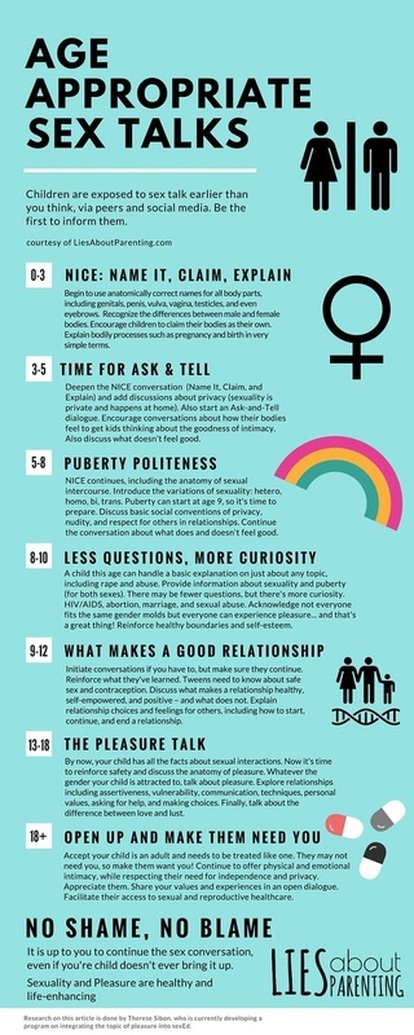Talking Body, Sex and Safety with Children

Trusting that kids will learn the way the parents did, or to pass on the same information they got when they were kids would not be enough as there is always new research, studies and understanding that comes up an it helps parents to know what the current state of knowledge is in these matters. Secondly, there may be differences in how one’s child perceives their body than how the parents may have seen themselves – every body is different, so to say, and we need to have the flexibility to work with the children as they need.
Conversations on sex and health ideally should start really early and happen all through life, in an age-appropriate manner. Even before starting such conversations, it is important that the parents learn about body, sex and health themselves, and be sure that they have appropriate understanding.
We need to develop a greater ability among parents and care-givers to talk about body, sex and safety with their children.
Conversations on sex and health ideally should start really early and happen all through life, in an age-appropriate manner. Even before starting such conversations, it is important that the parents learn about body, sex and health themselves, and be sure that they have appropriate understanding.
We need to develop a greater ability among parents and care-givers to talk about body, sex and safety with their children.
Does your child share as much as before?Most young children, especially when they just start school, can’t wait to come and share everything they experience with their parents. They are open and everything seems fine, but as soon as kids grow into middle school, the conversations dry up leaving parents wondering what happened. When looking at how parents and children talk with each other, certain patterns emerge which give a clue why this happens:
How do you build and keep trust?It is the parents’ responsibility then to ensure that they remain open for any sort of communication with their child. It takes conscious effort from parents to make this happen and to sustain it. You can get a great start by:
Parents are more successful in being able to hold serious conversations when:
|
Can you & your child talk about anything?Getting children to trust parents enough to ask about anything is a long-term trust building exercise. They need to trust you implicitly, and that means that they need to know that you are OK to talk about anything at all – this includes topics that you might have learned to think off as taboo, topics you may not know, are squeamish about or believe have a certain age and space.
That kind of trust comes with being conscious about your parenting, and taking an approach that you are here to discover the world again with your child, and that while you do know a lot more, there is much that they are going to challenge you to think afresh about a number of things and how you feel about them. It requires that parents spend a fair bit of time and energy to get to know the child, enjoy them for who they are, are encouraging without being too critical, supportive and loving. Parenting can be very challenging, and even with the best of intentions, parents can say/ do things that threaten the trust. Some things that parents might do that hurt are:
Children will keep testing parents to see if they are still trustworthy, and one of the big challenges of parenting is to stay open to such tests instead of reverting to parental authority to demand obedience. Even if the trust has been shaken up, or has cracks in it, trust can be regained with effort:
“Before the child ever gets to school it will have received crucial, almost irrevocable sex education and this will have been taught by the parents, who are not aware of what they are doing.” |
Age appropriate conversations
|
Conversations on sex and health ideally should start really early and happen all through life, in an age-appropriate manner. Even before starting such conversations, it is important that the parents learn about body, sex and health themselves, and be sure that they have appropriate understanding.
|
Who should have the sex talk?It is a myth that these conversations are best between father and son, and mother and daughter. It is often our own discomfort that gets mirrored as if it were a rule, especially in families where traditionally gender roles have been very firm and fixed. In fact, when all genders can talk about body, sex and safety with each other, a lot more respect and awareness for everyone is likely.
Segregating body, sex and safety talk by genders also could have the aspect of making it a bigger mystery and either glorifying or demonizing it, and could have the unfortunate side-effect of impairing ability to converse with people of different genders and making it the awkward, gangly teenager talk that one is so used to seeing in popular media. Breaking through this myth, and being able to talk about body, sex and safety in the presence of all the genders in the family normalizes it and helps the child feel a lot more relaxed and comfortable in social situations. We would encourage that parents could jointly have these conversation, or both have parallel on-going chats about the topic whenever the need comes up. Should topics that are apparently gender-specific (such as menstruation, night fall etc) come up with the parent of other genders, then we would still suggest that the person it comes up with engages in the conversation, or brings in others while continuing to be part of the conversation. If your partner is unwilling to have the talk with the child, either separately or with you:
|
What after the sex talk?Conversations on sex and health are much more than just the basics of reproduction. Even before starting conversations about reproduction, it is important that parents talk to their children about body, sex, safety, consent and health. Even after having the birds and the bees talk, it is still important to continue to engage with the children on the topic, especially on matters related to safety, consent and health.
Children go through on ongoing exploration and understanding of their body and the social norms that go with body, sex and health and will have ongoing needs for information and learning. Some of the key conversations that will continue to be important through teenage and older are:
|
Worried about what kids are learning from their environment?
Children learn and form their own identity, aspirations and express themselves based on what they learn from every source available to them, including friends, internet, magazines, TV shows, teachers, seniors at school and everything else, and apply it to what they believe about themselves. The sad truth is that there is so much information out there that is patriarchal, body-shaming, sex-shaming and just not good at all.
Parents seeking to bring up their children free from stereotypes and with a lot more personal freedom do have an uphill task, and need to be very clear on their parenting involvement from the start. Some key things for such parents to incorporate would be:
We believe that one of the core principles of parenting is that it is an act of responsibility, and some of that responsibility is also about taking a wider perspective regarding children's safety.
Parents seeking to bring up their children free from stereotypes and with a lot more personal freedom do have an uphill task, and need to be very clear on their parenting involvement from the start. Some key things for such parents to incorporate would be:
- Ensure a wide range of exposure to the child. Curtail some of the intrusive and yet persuasive media such as fairytales, and replace them with more secular stories
- Take extra care when sharing religion, mythology or other such traditional aspects as they often come loaded with gender stereotyping
- Encourage independent critical thinking from an early stage. Ask the child often what she feels like, thinks and wants. Help the child have a clear individual perspective, while maintaining empathy
- Watch any shared play time, play dates etc with other children, and look to influence such times to help your child and her company to consider and choose among a variety of options
- Actively campaign and lobby schools and other institutions that the child goes to so that they are more evaluative of what they say, rather than pass on unhelpful material
We believe that one of the core principles of parenting is that it is an act of responsibility, and some of that responsibility is also about taking a wider perspective regarding children's safety.
When do you seek help? |
If you find that you have not really paid much attention to talking about body, sex and safety with your child, and now it is high time, or you find that you want to learn more about it, please call.
We do hope to see more parents who want to proactively learn to address these topics, challenge their own understanding, and be more positive in how they talk to their children. That said, if at any time, you believe you have reason to be concerned that your child might be sexually active, or have been coerced into sexual activity, and you want to check in on how to address it, please talk to a counsellor right away. More Information |
|
1. TARSHI
2.Parenting.com on Talking to kids about sex 3 KidsHealth.org on Q&A on talking to kids about sex 4. Healthy Feminism on Teaching Kids Consent 5. NSPCC: Talking about difficult topics |

